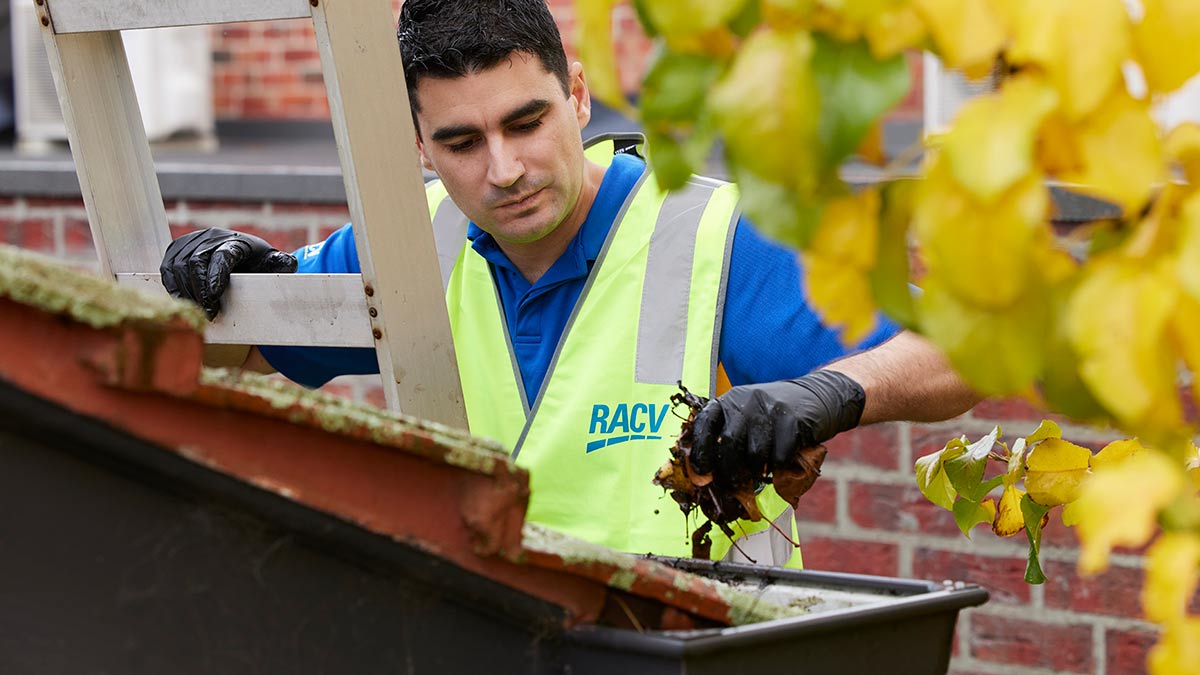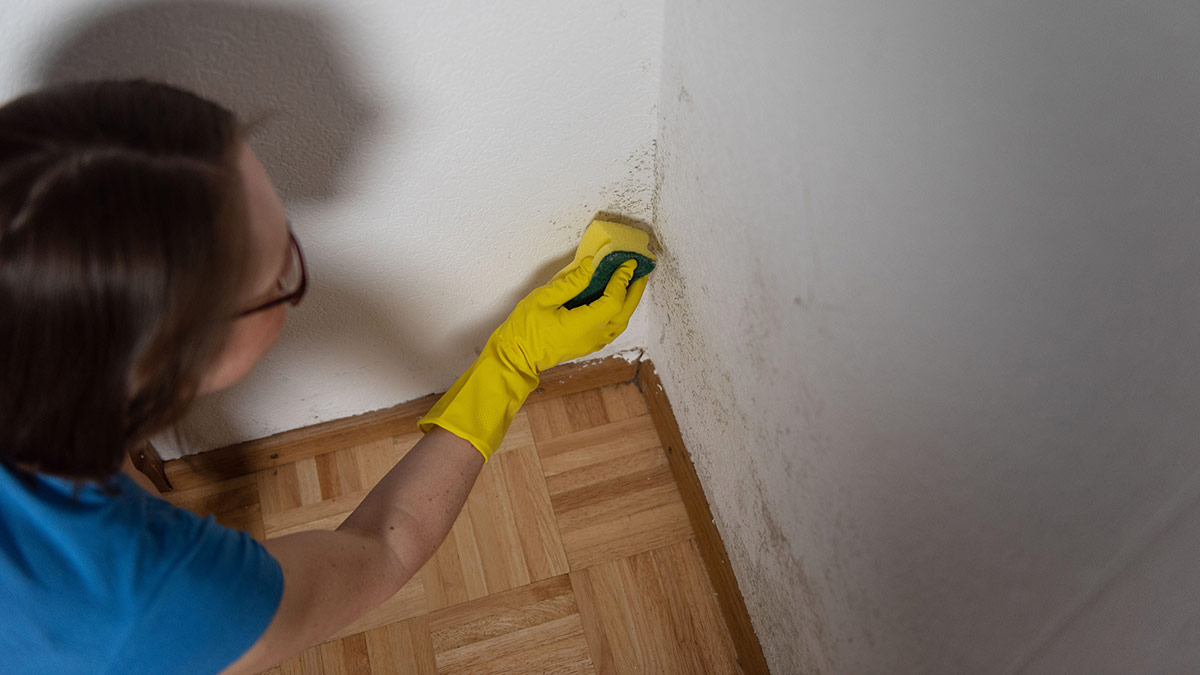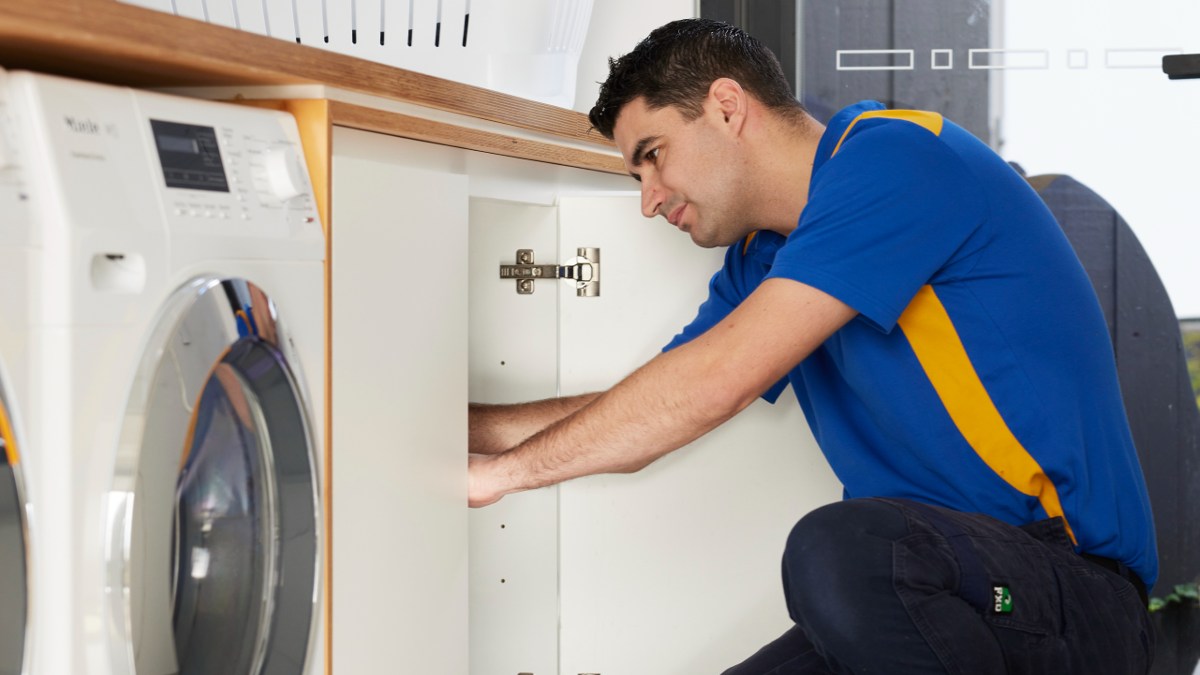Mould can cause major damage to your home and health. Here's how to prevent mould in your home, how to remove existing mould and how to stop it from coming back.
How to prevent water damage in your home

Burst pipes and flexi hoses are a common home maintenance issue that can become a costly problem if left untreated. Here's how to prevent, detect and fix water leaks and water damage in your home.
During the 2024-2025 financial year, RACV recorded 3,966 water damage claims, an increase of 15 per cent on the year prior.
While water damage can be a common home maintenance issue, being proactive can reduce the chance of a surprise leak or burst pipe. Even simple steps, such as learning the signs of an early or impending leak, can minimise the chance of severe water damage occuring in your home.
In the event of a burst or blocked pipe, internal water leak or faulty hot water system, get rapid-response professional help.
How to prevent water damage at home
Ensure all pipes and flexi hoses are installed by a licensed plumber
No matter how simple a job may seem, it’s important to always have a licensed plumber install flexi hoses and other plumbing products in the home.
Flexi hoses are a type of plumbing fitting common throughout kitchens, laundries and bathrooms. Also known as flexible braided hoses or flexible plumbing hoses, these fittings consist of a rubber tube encased in a metal mesh. This flexible construction allows the hoses to be bent and used in tight spaces, such as beneath bathroom vanities and under kitchen sinks, where they connect plumbing appliances to the water supply.
However, while good-quality, professionally-installed flexi hoses can last many years, no flexi hose is truly burst proof and will eventually begin to degrade. This can lead to leaks that, because of the 'hidden' locations that flexi hoses are commonly installed in, go undetected until significant water damage has occurred. Even a pinhole leak can be disastrous if left for a prolonged period.
A licensed plumber will follow best practice protocol and ensure that pipe and flexi hose installation is completed safely for minimal risk of leaks or bursting.
Check appliances for water leaks
Regular inspections for leaks is a crucial aspect of preventing water damage. Even small leaks can cause significant damage over time if left untreated.
Check underneath sinks and around dishwashers, toilets and washing machines for signs of leaking water, as well as fraying or kinking flexi hoses. Any leaks should be promptly fixed by a licensed plumber.
Some water leaks aren't so noticeable. Other signs of degraded pipes or flexi hoses include:
- An unexplained hissing noise in your home that you can't pinpoint
- Damp pipes, even if there is no noticeable leak
- Water staining
- Mould
- Unexpectedly high water bills
- Structural damage (e.g. bubbling paint, warping floors or walls)
Regular home maintenance that includes a licensed plumber checking any flexi hoses for signs of water leaks and damage can be the difference between a minor and fixable problem, or major water damage to your home in the future.

Having your gutters cleaned at least once a year can help prevent water leaks in your roof.
Keep your gutters and downspouts clean
Clogged gutters and downpipes can lead to water overflow, causing damage to your home's foundation, walls, and landscaping before you even realise they're blocked.
Clean your gutters and downpipes regularly, removing leaves, debris, and any obstructions to ensure proper water flow. It's recommended that your gutters are cleaned out at least twice a year; if your home is surrounded by large trees, you may need to have them cleaned more often.
Working at height on ladders can be risky, so consider hiring a professional to give your gutters a thorough clean.
Routinely inspect your roof and ceilings
Regularly inspecting your roof and ceilings can help you identify any potential leaks or damage. Look for signs of water penetration like tea-coloured stains on plaster or damp spots on the joints.
From the outside, check for things like missing or cracked roof tiles, whether the flashing surrounding the chimney is intact, and other signs of visible water damage.
In addition, keep any overhanging trees trimmed so that large branches cannot fall down on your home during bad weather and damage your roof.
It's especially important to inspect your roof after a storm when strong winds and rain can cause significant damage.
Read more: How to protect your home from strong winds
Properly insulate exposed pipes
Insulating your exposed pipes can help prevent them from freezing and bursting during winter in colder areas. Insulating hot water pipes can also help retain heat and reduce energy loss, saving you money on your utility bills.
Insulation sleeves or wrapping can be easily installed by licensed plumbers to protect your pipes from extreme temperatures.
Look for moisture and mould in your home
Mould in the home is a serious problem that needs to be addressed quickly. While dehumidifiers can help remove damp air that leads to mould, they won't do much if the root cause of the mould is an unaddressed water leak.
When inspecting the inside of the home for the beginnings of water damage, look for signs like flaking paint or wallpaper, as well as speckled marks on skirting boards. Condensation on skylights or windowsills in the mornings can also be a sign there is above-average moisture levels in the house.

Unchecked water damage can lead to structural problems as well as mould. Image: Getty
Know your water main's location
Your water main controls the flow of water to your property. In the case of a plumbing emergency, such as a burst pipe, the water main's shut-off valve allows you to turn off the water supply to your entire home to prevent further water damage.
The water main shut-off valve is usually located at the front of the house, near the water metre or where the main water line enters your property. It should be protected by a council plate. Familiarise yourself with its location and make sure it is easily accessible in case of an emergency.
To turn off the water main shut-off valve, turn it clockwise to its closed position. If the valve is stiff, wear protective gloves or use pliers to help you slowly and evenly turn the valve.
Once you've turned off your water main contact a licensed plumber or emergency assist provider to repair the leak.
Consider a water leak detection device
A water leak detection device is a relatively inexpensive product that has sensors to detect leaks or abnormal water levels.
By installing a water leak detection system, you can quickly identify and address leaks, preventing extensive damage and minimising repair costs. While you should be able to have confidence in plumbing work you know has been recently completed by a qualified tradesperson, water leak detection devices can be particularly useful when moving into an older property where plumbing is more likely to be ageing or the workmanship uncertain.
A water alarm is another useful device. Water alarms are small, battery-operated devices that emit a loud sound when they detect water. These alarms are typically placed in areas prone to water leaks, such as laundry rooms. By alerting you to the presence of water, water alarms allow you to take immediate action, preventing further damage and potential mould growth.

Don't forget to check under cupboards and behind appliances if you suspect a water leak - flexi hose leaks can be small, hidden and damaging.
What to do if you discover a water leak or water damage in your home
Discovering a water leak, or damage from a leak that's been left too long, is an unpleasant experience.
Acting fast can help minimise damage. Stop water flow to the leaking hose, pipe or appliance by either switching it off at a wall valve or (if there's no wall valve) by turning off the water mains.
It is illegal in Victoria to do many plumbing jobs unqualified. Contact a licensed plumber or emergency assist provider to get your water leaks fixed fast and professionally.
Water leaks and damage in rental properties
In Victoria, the following plumbing issues are considered urgent repairs:
- Burst water service
- A blocked or broken toilet system
- Serious roof leaks
- Flooding or serious flood damage
- A non-working essential service or appliance for laundry, hot water or water
- An appliance, fitting or fixture that is not working and which causes a lot of water to be wasted
- Any fault or damage to the property that makes it unsafe or insecure, including mould or damp
- Any issue that causes the property to not meet the Victorian minimum rental standards.
A maintenance task that is considered as urgent repairs must be reported to the rental provider or property manager via the emergency contact number provided as soon as it is noticed. The renter should then also follow up with an email confirming the request.
The rental provider or manager must then make the required repairs immediately.
RACV Trades is a trading name of RACV's trade partner, Club Home Response Pty Ltd (Victorian registered domestic building practitioner number CDB-U 100178). All works are performed or arranged by Club Home Response Pty Ltd. trading as RACV Trades.


